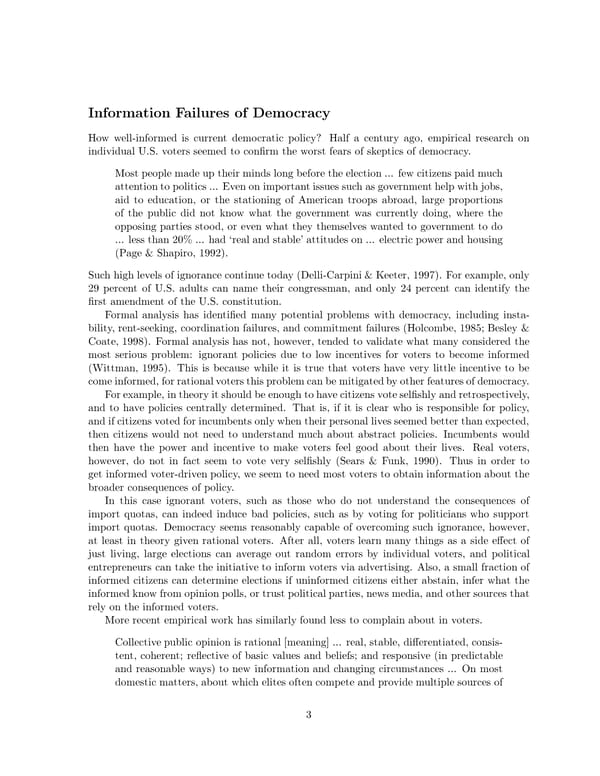Information Failures of Democracy How well-informed is current democratic policy? Half a century ago, empirical research on individual U.S. voters seemed to confirm the worst fears of skeptics of democracy. Mostpeople made up their minds long before the election ... few citizens paid much attentionto politics ... Even on important issues such as government help with jobs, aid to education, or the stationing of American troops abroad, large proportions of the public did not know what the government was currently doing, where the opposing parties stood, or even what they themselves wanted to government to do ... less than 20% ... had ‘real and stable’ attitudes on ... electric power and housing (Page & Shapiro, 1992). Such high levels of ignorance continue today (Delli-Carpini & Keeter, 1997). For example, only 29 percent of U.S. adults can name their congressman, and only 24 percent can identify the first amendment of the U.S. constitution. Formal analysis has identified many potential problems with democracy, including insta- bility, rent-seeking, coordination failures, and commitment failures (Holcombe, 1985; Besley & Coate, 1998). Formal analysis has not, however, tended to validate what many considered the most serious problem: ignorant policies due to low incentives for voters to become informed (Wittman, 1995). This is because while it is true that voters have very little incentive to be comeinformed,forrationalvotersthis problemcanbe mitigatedbyother featuresof democracy. Forexample, intheoryit should be enough tohave citizens voteselfishly and retrospectively, and to have policies centrally determined. That is, if it is clear who is responsible for policy, andifcitizens voted for incumbents only when their personal lives seemed better than expected, then citizens would not need to understand much about abstract policies. Incumbents would then have the power and incentive to make voters feel good about their lives. Real voters, however, do not in fact seem to vote very selfishly (Sears & Funk, 1990). Thus in order to get informed voter-driven policy, we seem to need most voters to obtain information about the broader consequences of policy. In this case ignorant voters, such as those who do not understand the consequences of import quotas, can indeed induce bad policies, such as by voting for politicians who support import quotas. Democracy seems reasonably capable of overcoming such ignorance, however, at least in theory given rational voters. After all, voters learn many things as a side effect of just living, large elections can average out random errors by individual voters, and political entrepreneurs can take the initiative to inform voters via advertising. Also, a small fraction of informed citizens can determine elections if uninformed citizens either abstain, infer what the informed know from opinion polls, or trust political parties, news media, and other sources that rely on the informed voters. More recent empirical work has similarly found less to complain about in voters. Collective public opinion is rational [meaning] ... real, stable, differentiated, consis- tent, coherent; reflective of basic values and beliefs; and responsive (in predictable and reasonable ways) to new information and changing circumstances ... On most domestic matters, about which elites often compete and provide multiple sources of 3
 Shall We Vote on Values, But Bet on Beliefs? Page 4 Page 6
Shall We Vote on Values, But Bet on Beliefs? Page 4 Page 6